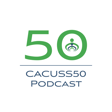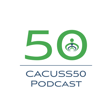
CACUSS50 Podcast - Teaser Episode
The CACUSS50 Oral History Project is an initiative of the Canadian Association of College and University Student Services in recognition of our organizations 50 years of engaging student affairs professionals in Canada. This episode, we are joined by our on-air host team to talk about what you can expect as a listener of this pod, and also to get a glimpse into what they are most excited for as we role out our first season of the CACUSS50 Podcast!
The series of podcasts is recorded and produced by: Sean Fast, Adam Kuhn, Nicholas Fast, Rachel Barreca, Stephanie Muehlethaler, Noah Arney, Sally Chen, Estefania Toledo, Paula Broderick, Jennifer Brown, Margaret de Leon, and Becca Gray. This podcast is recorded, produced, and published on the traditional territories of hundreds of Indigenous nations from across the northern half of Turtle Island, also known by its settler-colonial name, Canada. We are grateful for the opportunity to live, work, and learn on this land. For more information on the territories you may reside on, visit: https://native-land.ca/
Music: Expanding the Limits | Performed by Audiorezout & Written by Oleksii Striapchyi | Stock Media provided by Audiorezout/Pond5
Podcast Cover Art by: Ravi Gabble (UTM)

